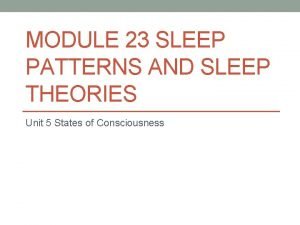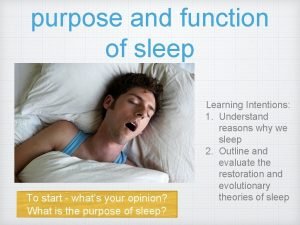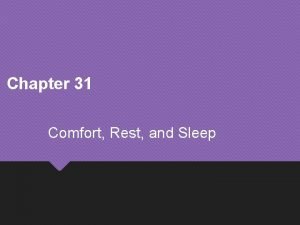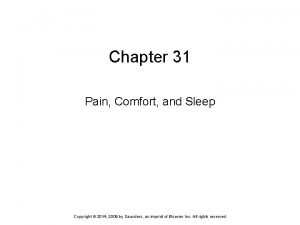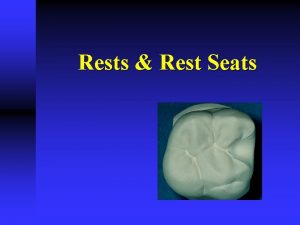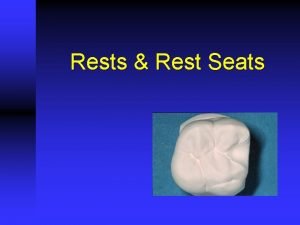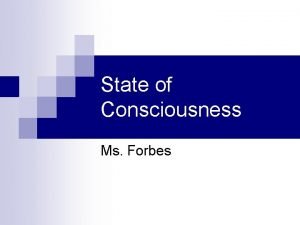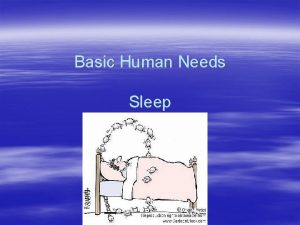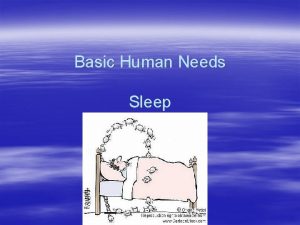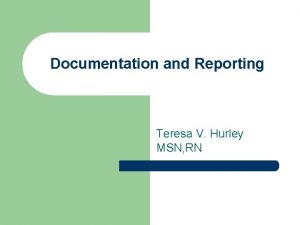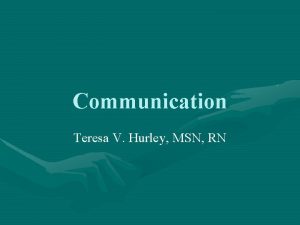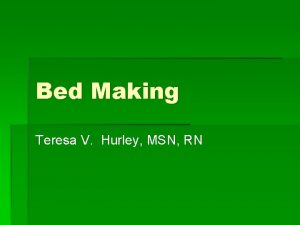Rest and Sleep Teresa V Hurley MSN RN









- Slides: 9

Rest and Sleep Teresa V. Hurley, MSN, RN

Sleep Physiology • Circadian Rhythm – Sleep-wake cycle or biological clocks – Early birds and night owls – Interruption of cycle • • Anxiety Restlessness Irritability Impaired judgment

Sleep Physiology • Sleep Regulation by CNS, peripheral nervous, endocrine, respiratory, muscular and cardiovascular systems • Stages of Sleep – Non-rapid eye movement (NREM) • • 4 stages during a 90 minute cycle from light to deep sleep (harder to arouse) Body tissue restoration HR decreases to 60/min or less Interruption (confusion, suspicion, mood changes, immune suppression, accidents) – Rapid eye movement (REM) • End of each sleep cycle • Dreams more vivid and elaborate • Learning, memory processing, stress adaptation

Factors Affecting Sleep Examples – – – Pain Physical Discomfort Difficulty Breathing (COPD, Asthma, Colds etc. ) Mood (anxiety or depression) Nocturia Restless legs syndrome prior to sleep (rhythmic movements and itching) – GERDS

Sleep Disorders • Dyssomnias – Intrinsic (initiate and maintain sleep due to psychophysiological) • Narcolepsy • Obstructive sleep apnea – Extrinsic (external factors) – Circadian (sleep time/preference) • Time zone change • Shift work • Parasomnias – – – – – Sleepwalking Sleep terrors Sleep talking Noctural leg cramps Nightmares Sleep paralysis Teethgrinding Bedwetting SIDS

Factors Affecting Sleep • Age: less time as age • Drugs (L-trytophan in cheese, milk and meats promote sleep) • Lifestyle (shift work, changing meal time) • Emotional Stress • Environment (temperature, sound, lighting) • Exercise (less than 2 hours before bedtime)

Factors Affecting Sleep • Food and Caloric Intake (caffeine, alcohol, spicy, large meal, milk allergies in infants and food allergies as corn, chocolate, yeast, food dyes, wheat, eggs; wtg loss and gain

Nursing Interventions • Promote bed time rituals and routines • Adjust environment • Back rub if not contra-indicated Provide Pain relief measures Do not interrupt sleep unless absolutely necessary Establish periods of rest and sleep

Pharmocolgic • Hypnotics produce sleep • Sedatives produce calming effect
 Module 23 sleep patterns and sleep theories
Module 23 sleep patterns and sleep theories Module 23 sleep patterns and sleep theories
Module 23 sleep patterns and sleep theories Module 23 sleep patterns and sleep theories
Module 23 sleep patterns and sleep theories Chapter 31 comfort rest and sleep
Chapter 31 comfort rest and sleep Chapter 31 pain comfort and sleep
Chapter 31 pain comfort and sleep Butterfly clasp denture
Butterfly clasp denture Direct retainer in rpd
Direct retainer in rpd Lingual rest
Lingual rest Thou blind man's mark summary
Thou blind man's mark summary Adults spend about ______% of their sleep in rem sleep.
Adults spend about ______% of their sleep in rem sleep.
